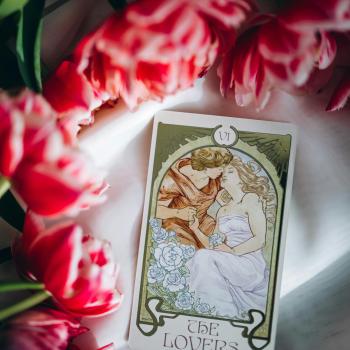Below you will find an excerpt from a conversation in a Pagan social media group, edited for grammar and clarity. Guess which one is me.
Pagan 1: “I know I really shouldn’t, but what are some love spells to bring back an ex?”
Pagan 2: “He’s your ex for a reason.”
Pagan 3: “A spell to let go might be more helpful than a love spell.”
Pagan 4: “Nope.”
Pagan 5: “Just don’t.”
Pagan 6: “Do a spell for self-love instead.”
Pagan 7: “On a Friday evening, during the waxing Moon, stick seven pins in a straight line down the side of a pink taper candle. Place two lodestones seven inches apart in front of the candle, naming one of them for you and the other for your ex. Light the candle, move each lodestone half an inch toward the other, and recite the Song of Solomon until the candle burns down to the first pin. Repeat every day for seven days: On the seventh day, make sure the lodestones are touching and magnetized together. Once the last pin has fallen, let the candle burn itself out, then place the lodestones in a small, red bag along with some rosebuds, damiana, and Balm of Gilead. Tie the bag shut with pink string, keep it tucked in your underwear during the day, and sleep with it under your pillow.”
Pagan 8: “I did a love spell for someone once. He regretted it and had to get a restraining order.”
My participation in the discussion fit my usual M.O., in that I was going, “Dooooo iiiiit,” while everyone else was going, “Wanda, no! Mustn’t rewrite reality.” Regardless, the thread quickly simmered down once Pagan 9 swept in to Set Things Right.

Pagan 9 explained that they were very experienced in these matters, and while they had never actually cast a love spell themself, they had in the past performed [thunderclap] “manipulative” magic, the kickback of which wasn’t pretty. “I see so many want to resort to magick to fix or attract things,” they opined with a virtual sigh, “but never do anything to further their souls.”
Okay. I fully believe that magic can and should be used for self-improvement and spiritual growth — as my friend Sarah says, Chaos Magic is the Cognitive Behavioral Therapy of the occult world. So I get it. But I also believe that magic should be used for, y’know, magic. And it bugs me when questions about using magic are met with safe, pedestrian answers.
I come across this a lot when the topic is hexing and cursing, but it also bubbles up when the inquiries are career-related. Someone asks about a spell to find a new job and is given tips on updating their résumé; someone wants to make a charm to fend off an aggravating co-worker and is told to file a complaint with their HR department. And while such mundane suggestions are not unsound… I mean, the questions are about magic, y’all. Mundane suggestions aren’t relevant. Especially when the OPs have to clarify over and over that they’re already doing the drudgework.
You know how, in horror movies, a carload of slutty teenagers will pull up to a decrepit gas station with an old, grizzled dude sitting out front, and the jock of the group will go, “Hey, grandpa! Which way to the abandoned mining town?” And the old dude will puff on his pipe and be like, “Oh, just a ways up yonder. Five miles west as the crow flies, I reckon. But I warn you: No slutty teenager has ever returned from that unholy place.” And the kids will go, “Lol whatever,” and then zoom away and end up disemboweled? I feel like more of us in the Pagan community could take on the role of the old, grizzled dude, providing direct answers along with honest disclaimers.

This is why I liked Pagan 8’s response, even if she didn’t include the details of her spell: “I did a thing, and there were consequences to the thing. Caveat emptor.” I feel like that’s more useful than just, “Don’t do the thing.” Although it really would’ve been better if she’d added, “I made an herbal charm with these ingredients…” or, “Here’s the candle magic I used…” or even, “I snuck some of his pubic hair into her coffee grinder,” followed by, “… and he had to get a restraining order. In retrospect, I do not recommend.”
And then the rest of us could’ve been like, “Wow, thanks! We appreciate you sharing your knowledge and experience! Now, who’s got a good spell for self-love instead?”


















